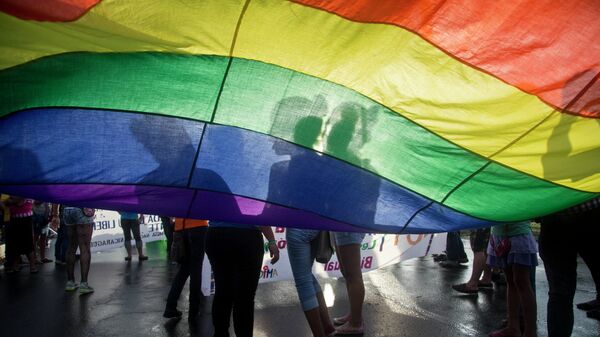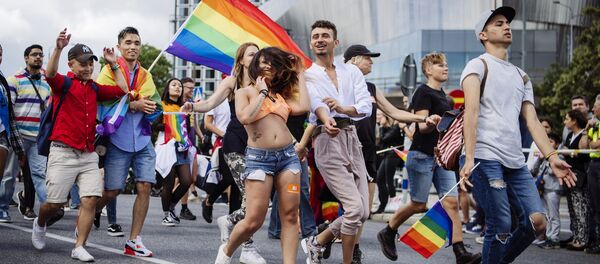The Indian apex court in a landmark judgment on Thursday decriminalized gay sex between consenting adults.
"We are thankful to millions of people who stood by the LGBTQ community in its fight for equal rights. Today is a historic day for the gender minorities of India. It shall be always remembered. The decision of the court today reaffirms the faith of the common citizen of India in our judicial process and justice system," Prince Manavendra Singh Gohil, a gay rights activist, told Sputnik.
The court's decision has been welcomed by numerous people.
Can I please be friends with the judges on the 377 bench? Such beautifully worded opinions. Chief Justice of India reads from the judgements "Take me as I am" "Look for the rainbows in the clouds" "Denial of self expression is like death"
— Shilpa Rathnam (@shilparathnam) September 6, 2018
Yayeee!! Good on you Hon’be #SupremeCourt & thank uuuuu! I hope the citizens of #India are listening! “Majoritarian views and popular morality cannot dictate constitutional rights. We have to vanquish prejudice, embrace inclusion and ensure equal rights.” https://t.co/sFT2fo5TGe
— Swara Bhasker (@ReallySwara) September 6, 2018
So pleased to learn that the SupremeCourt has ruled against criminalising sexual acts in private. This decision vindicates my stand on Section 377& on exactly the same grounds of privacy, dignity &constitutional freedoms. It shames those BJP MPs who vociferously opposed me in LS.
— Shashi Tharoor (@ShashiTharoor) September 6, 2018
Seen Outside the SC: James Williams is a 33-year-old American citizen, his boyfriend Ayush Thakur is Indian. James hopes the Supreme Court will say goodbye to Section 377 today. Also, gotta love their style ❤️ #Goodbye377? pic.twitter.com/8b8yPt59Yp
— Meghnad Bose (@MeghnadBose93) September 6, 2018
Earlier, in the argument stage, the central government had said it would not contest the petitions.
"I state and submit that so far as the constitutional validity (of) Section 377 to the extent it applies to 'consensual acts of adults in private' is concerned, the Union of India would leave the said question to the wisdom of this Hon'ble Court," read the affidavit submitted by the Ministry of Home Affairs in the case.
Section 377 of the IPC referred to "unnatural offenses" and said whoever voluntarily had carnal intercourse against the order of nature with any man, woman or animal, shall be punished with imprisonment for life and shall also be liable to pay a fine.
The section came into force in 1861 during the British rule of India and was adopted by independent India subsequently.
Meanwhile, the United Nations in India has welcomed the Supreme Court's judgment to partially strike down Section 377.
"The United Nations in India welcomes today's landmark ruling by the Supreme Court of India striking down a key component of Section 377 of the Indian Penal Code which criminalized specific sexual acts between adults, a law dating back to British colonial rule that has targeted in particular lesbian, gay, bisexual, transgender and intersex (LGBTI) individuals and communities, " a UN statement read.
We @UNICEF #India welcome the #SupremeCourt judgement striking down #Section377. #ForEveryChild, equality
— UNICEF India (@UNICEFIndia) September 6, 2018
Read the full @UNinIndia statement here 👉https://t.co/zX4F2QiWfN #Sec377 #377Verdict






